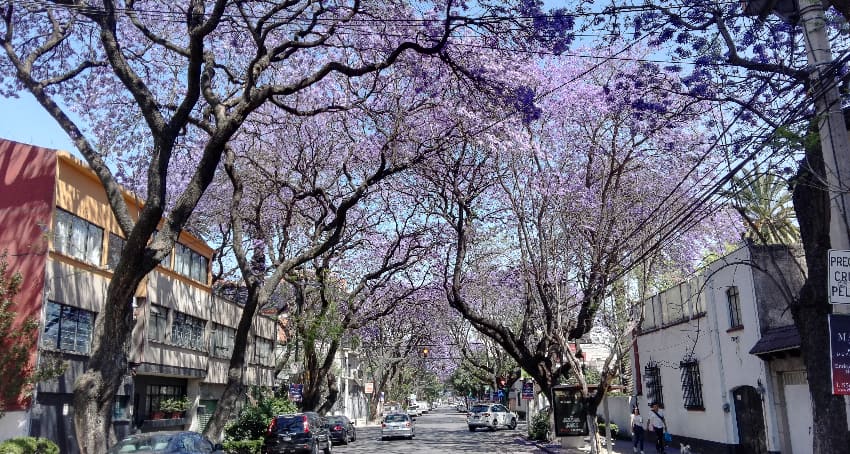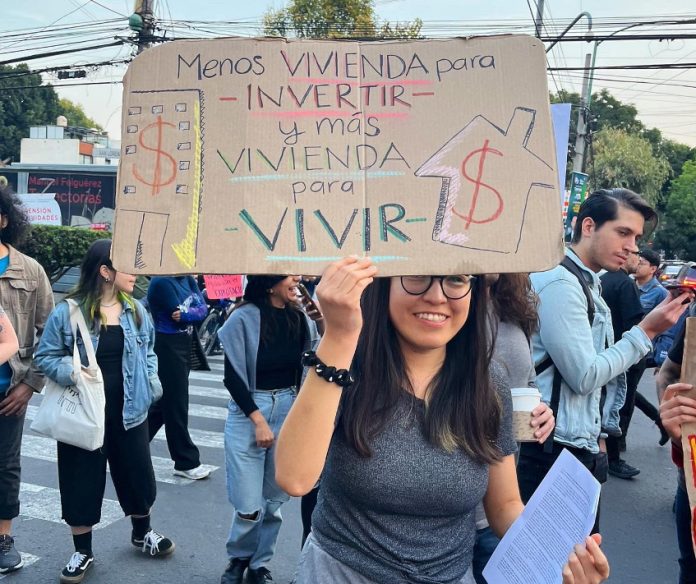“Housing is a right not an investment” and “No more gentrification or there will be a revolution” were among the battle cries of protesters who gathered outside the Mexico City Ministry of Urban Development and Housing (Seduvi) on Thursday.
Members of housing rights collectives and other citizens descended on the Seduvi headquarters in the del Valle neighborhood to denounce the recently-announced partnership between the Mexico City government and the accommodation booking platform Airbnb and to demand more equitable access to housing.
“The straw that broke the camel’s back was the agreement with Airbnb, but it’s not the only reason [we’re protesting],” Carla Escoffié, a lawyer and housing rights activist, told the newspaper Reforma.
“We see people here who were displaced before the pandemic, people from precarious settlements, indigenous people from Mexico City [who don’t have adequate housing],” she said.
The protesters demanded that the Mexico City government formulate a policy that guarantees citizens’ right to adequate and accessible housing. Such a policy should have measures to prevent disproportionate rent rises, they said. The protesters also demanded the creation of a tenants law that strikes a balance between the rights of renters and landlords, and urged the government to provide rent support to the city’s most vulnerable residents.
Led by Mayor Claudia Sheinbaum, the Mexico City government currently favors large real estate investors and corporations such as Airbnb over ordinary residents, Escoffié and other protesters asserted.
Máximo Ernesto Jaramillo, a housing rights activist and one of the organizers of Thursday’s protest, declared in an address to attendees that “fulfillment of the right to adequate housing is in crisis” in Mexico City.
For years people have been made to believe that their inability or difficulty to find and afford adequate housing is their own fault, he said, reading from a document submitted to Seduvi.

“But the reality is that Mexico City is experiencing a financialization of housing. For large companies, supported by the authorities, housing is no longer important as a place to live but as a financial asset,” Jaramillo said.
In the same document, activists claimed that 99% of revenue generated by rental properties goes to the richest 10% of the population, who are earning “historic profits” while less well-off residents are being forcibly evicted from their homes.
Some Mexico City residents have expressed concerns about the influx of foreigners including digital nomads to certain parts of the capital during the pandemic, asserting that their presence has pushed up rents – a claim backed up by data compiled by the real estate website propiedades.com – and driven locals out of desirable neighborhoods.
Those who attended Thursday’s protest believe that the agreement between the Mexico City government and Airbnb – under which they will collaborate to attract even more digital nomads to the city – will only exacerbate the problem.
Among other slogans that the protesters chanted were “Digital nomadism is structural racism” and “Multinationals, get out of our cities.”
They argued that stricter regulation should apply to Airbnb and similar companies, and asserted that the government’s agreement with Airbnb should be suspended while an analysis of Mexico City’s housing situation is carried out.
In Mexico City’s historic center, investors have bought up entire buildings to turn them into short term accommodation and forcibly evicted residents, one activist told the news website Animal Politico.
In an opinion piece published by Animal Político on Wednesday, Jaramillo said that rents have risen by 235% on average in Mexico City since 2005, an increase well above the inflation rate for the same period. Citing government data, he also wrote that 50% of dwellings in the Mexico City metropolitan area cost more than 3.2 million pesos (US $164,250) to buy, but only 4.7% of citizens could service a mortgage on such a property.
In addition, he wrote that the poorest 10% of Mexico City residents were spending 51% of their income on rent in 2020, up from 42% just two years earlier.
Back at the protest, a resident of Navarte – a neighborhood that is becoming increasingly popular with foreigners living or visiting Mexico City – told Reforma it shouldn’t be forgotten that gentrification affects the elderly as well as younger people.
“What about pensioners who live alone? Who will support us [when we need help]? The foreigners come to spend their dollars, but they leave us without neighbors, without community because they don’t mix with us,” said the woman, who was only identified as María Elena.
Escoffié, the lawyer and activist, said that the housing crisis extends well beyond the capital, asserting that there are problems “from Tijuana to Chetumal,” cities located at Mexico’s northwestern and southeastern extremities.
“… What we’re seeing are the cracks of a housing policy in Mexico that is in reality a real estate policy,” she said, claiming that the interests of real estate developers and investors take precedent over those of regular Mexicans who need a place to live.
Escoffié stressed at the conclusion of the protest that the fight for accessible, affordable housing and against current housing policies and authorities’ allegedly favorable treatment of companies such as Airbnb will go on.
“Let it be clear to the authorities that we’re going to continue … [fighting] until they stop fucking up the city. Mexico City isn’t a mall, Mexico City isn’t a hotel, Mexico City is … [people’s] home,” she said.
With reports from Reforma and Animal Político
